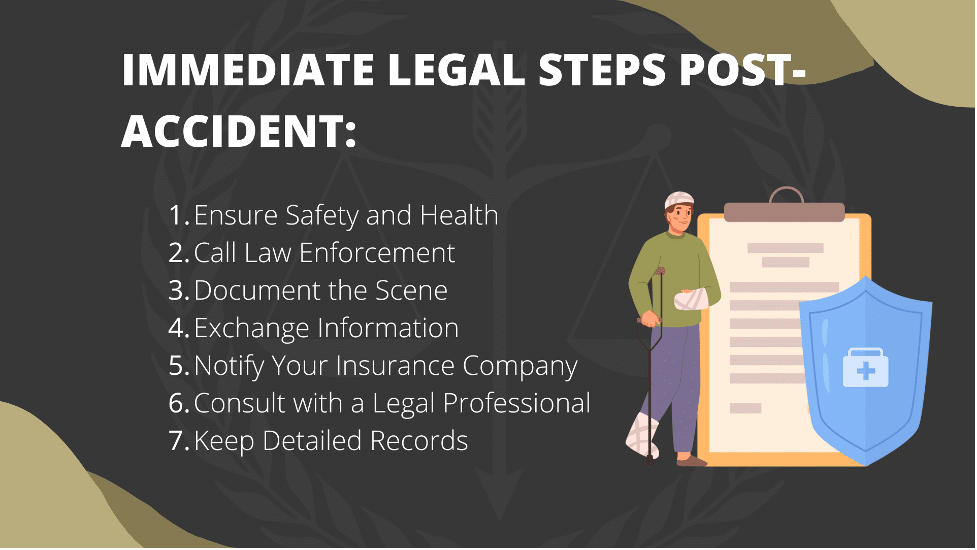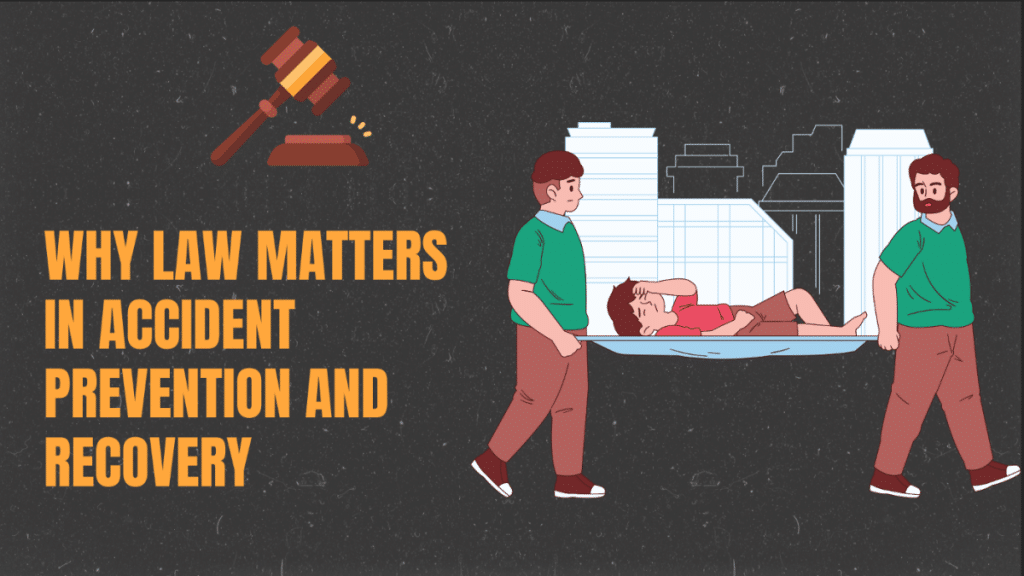Accidents on the road, at work, or elsewhere can devastate individuals, families, and communities. Strong legal frameworks play a crucial role in preventing such tragedies and promoting a culture of safety.
From establishing regulatory standards to enforcing compliance and holding individuals and corporations accountable, the legal system serves as a vital safeguard against preventable accidents.
Additionally, legal support and advocacy are invaluable in the aftermath, helping victims navigate complex processes, secure fair compensation, and access justice.
The Role of Legal Frameworks in Accident Prevention
Accidents on the road or at work can have devastating consequences. In the United States alone, motor vehicle crashes claimed over 38,000 lives yearly. Strong legal frameworks are crucial for preventing these tragedies and promoting a culture of safety.
Regulatory Standards and Compliance
Government regulations, such as Occupational Safety and Health Administration (OSHA) standards, set mandatory safety requirements for workplaces. Adherence to these regulations is crucial, as non-compliance costs employers an estimated $170 billion annually.
Similarly, traffic laws that govern speed limits, drunk driving, distracted driving, and vehicle maintenance help reduce the risk of road accidents. Strict enforcement mechanisms, including police patrols, automated systems like speed cameras, and sobriety checkpoints, are vital for ensuring traffic law compliance and promoting safe driving.
Impact of Legislation on Industry Practices
Laws and regulations shape industry safety standards across various sectors, including construction, manufacturing, transportation, and energy. For example, the Federal Motor Carrier Safety Administration (FMCSA) regulates the trucking industry by setting limits on driving hours, vehicle maintenance requirements, and mandatory rest periods to prevent fatigue-related accidents.
These regulations have been instrumental in improving safety standards and reducing accidents in the transportation industry.
Additionally, environmental laws and regulations, such as those governing the handling and disposal of hazardous materials, play a crucial role in preventing accidents that could harm both workers and the environment. In the event of an accident involving hazardous materials, experienced legal firms like Slaughter & Lupton Law PLLC can provide valuable guidance and representation to ensure compliance with environmental regulations and protect the rights of affected parties.
Legal Responsibilities and Accountability in Accident Prevention
Legal frameworks set the rules, but their effectiveness depends on the responsibilities and accountability of employers, employees, and corporations.
Employer and Employee Responsibilities
Employers have a legal obligation to provide a safe working environment for their employees. This includes conducting risk assessments, implementing safety protocols, providing proper training and personal protective equipment (PPE), and ensuring compliance with relevant regulations. Failure to fulfill these responsibilities can result in hefty fines, legal liabilities, and potential criminal charges in cases of gross negligence.
Employees also have a responsibility to follow safety protocols, report hazards or unsafe conditions, and correctly use the provided PPE. Open communication and a strong safety culture within the workplace are essential for effective accident prevention.
Corporate Accountability
Companies must implement strong corporate policies and safety measures to prevent accidents and ensure compliance with relevant laws and regulations. Non-compliance can lead to costly lawsuits, penalties, and reputational damage, which can have long-lasting effects on a company’s bottom line and public perception.
In cases of severe negligence or willful misconduct, corporate leaders and decision-makers might face criminal charges or personal liability. Notable examples include the Deepwater Horizon oil spill, where BP faced significant legal consequences and a $20.8 billion settlement.
Product Liability Laws
Product safety laws, such as the Consumer Product Safety Act, play a crucial role in preventing accidents by setting standards for product design, manufacturing, and labeling. These laws hold manufacturers accountable for ensuring their products are safe for intended use and provide clear warnings and instructions.
Landmark cases, such as the Ford Pinto fuel tank design flaws that led to numerous fatalities, highlight the importance of product liability laws in holding companies accountable and improving product safety.
Legal Support and Recovery Post-Accident
Despite the best prevention efforts, accidents can still happen. In these cases, legal support is crucial for recovery and compensation. If you are involved in a car accident, seeking the services of a car accident lawyer is vital to protect your rights and pursue fair compensation.
Immediate Legal Steps Post-Accident
Getting legal advice immediately after an accident is essential. An attorney can guide you through necessary steps, such as documenting the scene, gathering witness statements, preserving evidence, and ensuring proper medical attention. These steps can significantly affect the outcome of any legal proceedings or insurance claims.

Compensation and Legal Aid
Accident victims might be entitled to compensation through workers’ compensation or personal injury claims. However, navigating these complex legal processes can be challenging without proper guidance from a personal injury or car accident lawyer. Legal aid services provide invaluable support to those who cannot afford private representation, ensuring access to justice and fair compensation.
In cases of medical malpractice or personal injury due to negligence, a malpractice lawyer can help victims seek justice and appropriate compensation.
Victims may also consider seeking a personal injury consultation to understand their legal options and the best course of action.
For slip and fall accidents, slip and fall lawyers’ personal injury can provide specialized expertise in pursuing compensation for injuries sustained due to hazardous conditions or negligence.
The Role of Legal Advocacy
Hiring a specialized accident attorney can significantly impact the outcome of a case. These lawyers have extensive experience handling accident cases, negotiating with insurance companies, and representing clients in court if necessary. Their expertise can help accident victims secure fair compensation for medical expenses, lost wages, pain and suffering, and other damages.
Influence of Legal Reforms on Accident Prevention and Recovery
The legal landscape for accident prevention and recovery is constantly evolving. Governments and legislators continually strive to improve existing laws and introduce new reforms based on evolving societal needs, technological advancements, and lessons learned from past incidents.
Recent Legislative Changes
Recent years have seen several legal reforms aimed at enhancing safety and supporting accident victims. For example, the Moving Ahead for Progress in the 21st Century Act (MAP-21) introduced stricter penalties for violating trucking regulations, encouraging greater compliance from the industry and prioritizing public safety.
Future Legal Trends
Experts predict that future legal reforms will focus on stricter product safety standards, especially for emerging technologies like autonomous vehicles, artificial intelligence systems, and advanced robotics.
Additionally, there might be a greater emphasis on corporate accountability, with stricter penalties for negligence and potential criminal liability for corporate leaders in severe cases.
Legal frameworks may also evolve to better support and compensate accident victims through streamlined processes, expanded victim support programs, and improved access to legal aid.
Interplay Between Insurance and Legal Processes
Insurance plays a crucial role in accident prevention and recovery, and its processes are closely linked with legal requirements and procedures.
Insurance Regulations and Legal Requirements
Insurance laws govern many aspects of accident prevention and recovery, including mandatory insurance coverage for vehicles, workplaces, and specific industries. Legal professionals often navigate complex insurance claims, ensure compliance with regulations, and resolve disputes between parties.
Insurance companies also promote safety practices by offering incentives or discounts for implementing risk mitigation measures, such as driver safety programs or workplace safety initiatives.
Comparison of Legal Support Options
| Option | Expertise | Cost | Accessibility |
| Private Accident Attorney | Specialized in accident cases | High fees, often contingency-based | Limited for some individuals due to cost |
| Legal Aid Services | General legal knowledge may have specialized accident attorneys | Low or no-cost, eligibility requirements | Widely available in many communities |
| Law School Clinics | Supervised by experienced professors, student attorneys | Low or no cost | Limited availability, may have waitlists |
| Self-Representation | Dependent on the individual’s legal knowledge and research | No legal fees, but potential for costly mistakes | Risky for complex cases, not recommended |
Frequently Asked Questions
1. What legal actions should I take immediately after an accident?
After ensuring safety and medical care, document the accident, gather witness statements, and contact a legal professional to guide you through the next steps. Preserving evidence and following proper procedures can significantly affect the outcome of any legal proceedings.
2. How can legal regulations prevent workplace accidents?
Legal regulations establish mandatory safety standards and compliance requirements that organizations must follow. These regulations cover various aspects of workplace safety, such as equipment maintenance, hazard communication, and employee training. Strict enforcement of these regulations can significantly reduce the risk of workplace accidents.
3. What compensation can I expect if I’m involved in an accident caused by someone else’s negligence?
The compensation you may receive depends on the specific circumstances of your case and the effectiveness of your legal representation. Typically, compensation can cover medical expenses, lost wages, pain and suffering, and other damages. An experienced accident attorney can help you navigate the legal process and pursue fair compensation.
Conclusion
The importance of law in accident prevention and recovery cannot be overstated. Legal frameworks form the foundation of a safer society, while legal support and advocacy empower victims to seek justice and healing.
By continuously improving regulations, promoting accountability, and ensuring access to legal aid, we can create a more secure environment for everyone and provide a path to recovery for those affected by accidents.

